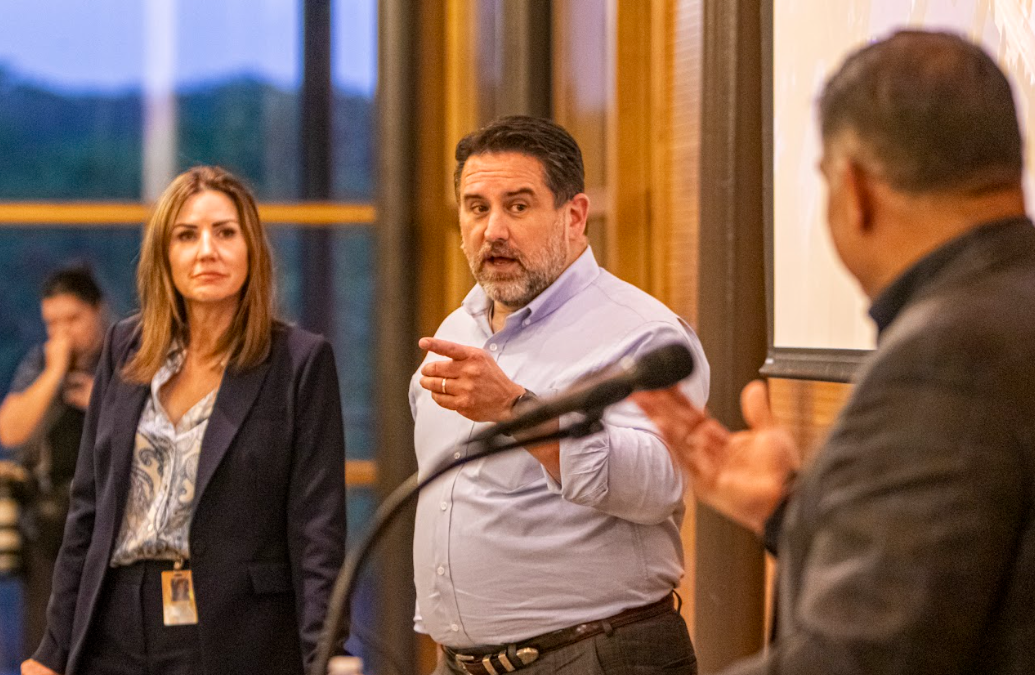 UTSA junior James Ghiden remembers the first time he became aware of race: “I was in the third grade,” he said, “I was
UTSA junior James Ghiden remembers the first time he became aware of race: “I was in the third grade,” he said, “I was
playing basketball at a Boys and Girls Club, and some kid called me a
‘nigger.’”
The talk with Ghiden’s parents came soon afterward. He thinks of that moment even today; this is why , for Ghiden, Black History Month matters.
“I feel like people like to imagine that Martin Luther King solved racism in America,” he said. “It’s important to realize the struggle continues.”
Black History Month began as Negro History Week in February 1926. Historian Carter G. Woodson deliberately selected the week between the birthdays of Abraham Lincoln and Frederick Douglass, because both men were revered by the black community.
The week was expanded into Black History Month during the revolutionary 1970s, and continues today to recognize and celebrate the achievements of African Americans.
However, a dialogue has gained attention. With the existence of #BlackLivesMatter, Black History Month is now experiencing a transformative moment.
In this period of self-reflection, black voices debate the achievements and setbacks.
While most agree that Black History Month is still very important, there are those within the black community who are ambivalent about its status today and its ability to implement real change.
“While I appreciate having (Black History Month) because at least it provides the opportunity to have a discussion, I feel like the problem is that it is an ongoing discussion,” said UTSA Department of English professor Dr. Sonja L. Lanehart, whose field of expertise includes sociolinguistics, language and literacy in the African American community.
“It’s an ongoing issue. It’s an ongoing problem. We have still not come to a resolution where all people are seen or treated equally, or equitably.”
According to statistics from the U.S. Census Bureau, only 19 percent of blacks under the age of 25 held a bachelor’s degree or higher in 2013. In her book “Invisible Men: Mass Incarceration and the Myth of Black Progress,” University of Washington sociologist Becky Pettit highlights how young black men between the ages of 18 to 34 were at least six times more likely to be incarcerated than young white men were.
With growing concerns of stagnancy, modern critics of Black History Month worry that it focuses solely on “exceptional” individuals rather than those who face adversity today. Who are the few, fortuitous pillars of historical prominence?
“Martin Luther King for sure. He’s the go-to,” said Ghiden. He paused to recall anyone else. “Malcolm X, Harriet Tubman, Rosa Parks. Maybe Frederick Douglass.” Despite a dedicated month to celebrate these individuals, Ghiden said Black History Month does not really affect him as a black American man today. “It’s important for your formative years,” he clarified.
Black History Month today is a nod to the past, but #BlackLivesMatter is a recognition and response to what the movement regards as systemic racism.
Lanehart believes the “#BlackLivesMatter movement has the potential to be transformative in the current climate of racial tension.
“I think #BlackLivesMatter has probably done more than all the Black History Months have yet to do,” she said. Through her involvement with the American Dialect Society, Lanehart (who teaches the course called #BlackLivesMatter) has garnered the awards for both “Hashtag of the Year” as well as “Word of the Year.” She attributes this achievement to social media and its capabilities as an activist’s tool.
“The hashtags Black Twitter comes up with and creates—it’s all part of consciousness raising, but also calls to action. And that’s something Black History Month has never been able to accomplish, unfortunately.”
Senior Tabbi Austin is the president of UTSA’s #BlackLivesMatter organization.
She said that Black History Month is the “one time of year where the spotlight is on us. We can take that and use it as a platform to discuss things that are really important, such as police brutality, use of excessive force, [and] education.”
Visibility has been achieved under this annual spotlight, but now that spotlight is pulled further into activism.
On-campus events sponsored by student groups and organizations are well underway. Aniriel Garcia-Vazquez is the graduate assistant for the Student Center for Community Engagement and Inclusion, and has worked on the planning committee to commemorate Black Heritage Month. While she understands that history and heritage are used interchangeably, she also notes there is a reason the committee focuses on heritage.
“Heritage is more about culture,” Garcia-Vazquezsaid. The committee began planning Black Heritage Month events with African American student organizations in November and the “history or heritage” debate occurred at this time.
History studies the past; while heritage incorporates culture and traditions. While this distinction seems to go unnoticed by students, it does strike a chord with Lanehart. Despite the cultural representations with music and food, she claimed that shifting the focus to heritage does a disservice.
“There’s nothing challenging; there’s nothing transformative. And that’s kind of insulting, to be perfectly honest. It’s problematic, especially on a college campus. Black History Month is meant to be more than talking about festivities and cultural byproducts,” Lanehart explained.
Garcia-Vazquez understands and empathizes with this critique. “I can definitely see that,” she said. She noted that some of the events aren’t necessarily “educating others” when that’s what she believes Black History Month is supposed to be.
“(When planning,) you’re more worried about the number of people that are going to come out and what would interest them, versus the meat of what you’re trying to say.” She said she hopes to appeal to various interests by highlighting facets of African American culture in a positive way.
Other campuses within the University of Texas System remain focused on black history and its relationship with present issues. UT-Arlington will host a “Conference on Critical Issues in the Black Community” and a panel on student activism, while UT-Dallas infuses culture and history with “The Art of Blackness” and an interactive discussion on #BlackLivesMatter.
Colonialism, colorism, and racial profiling are just a few of the topics to be covered. At UT-Austin, students can enjoy Duke Ellington jazz concerts, forums ranging from criminal justice reform to intersectionality, and a conference titled “Race, Democracy and Public Policy in America.”
A comprehensive list of Black Heritage Month events at UTSA is available at http://www.utsa.edu/inclusion/about/news-events.html.






